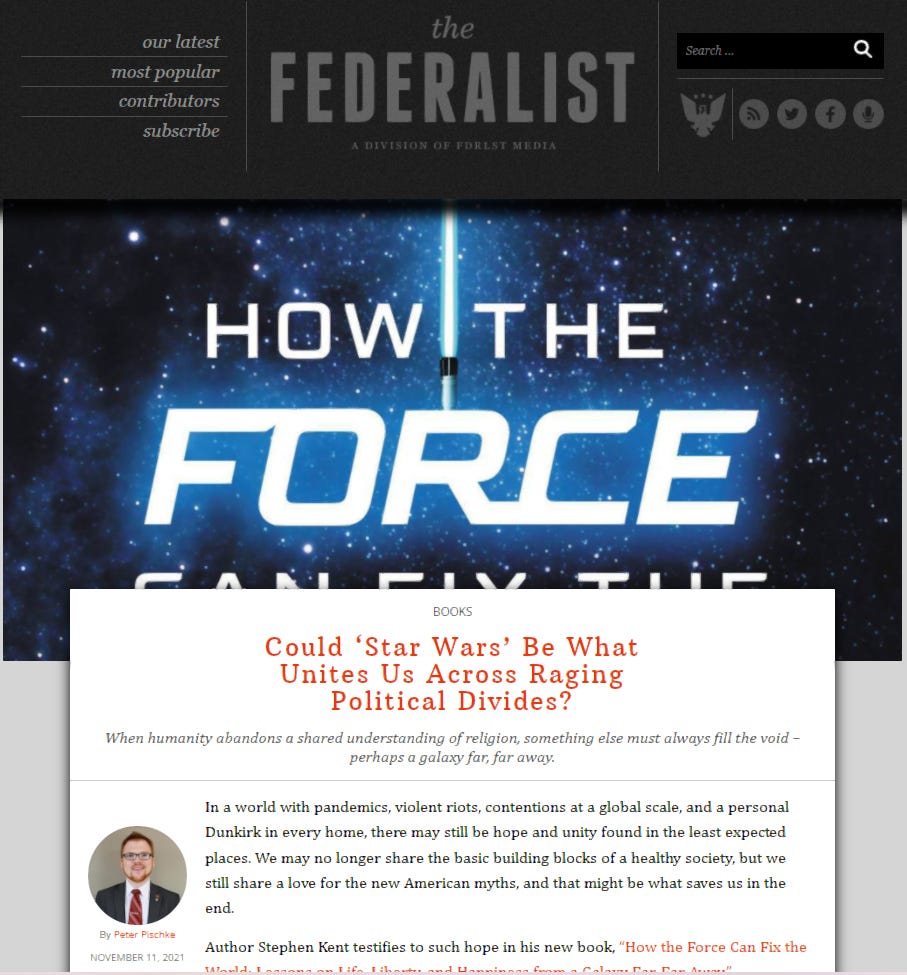Book Review: “How the Force Can Fix the World: Lessons on Life, Liberty, and Happiness from a Galaxy Far, Far Away.”
Could ‘Star Wars’ Be What Unites Us Across Raging Political Divides?
This is my book review of Stephen Kent’s latest book on Star Wars & Politics, you can find the original at the Federalist👈👈👈
In a world with pandemics, violent riots, contentions at a global scale, and a personal Dunkirk in every home, there may still be hope and unity found in the least expected places. We may no longer share the basic building blocks of a healthy society, but we still share a love for the new American myths, and that might be what saves us in the end.
Author Stephen Kent testifies to such hope in his new book, “How the Force Can Fix the World: Lessons on Life, Liberty, and Happiness from a Galaxy Far, Far Away.”
Kent is the creator of the popular Star Wars-meets-politics podcast, “Beltway Banthas,” which features guests from all sides of the political spectrum and is just one product of his focus on finding cultural platforms to bridge the political and cultural divisions feeding America’s cantankerous culture war. His new book follows this same ethos.
Kent asks his audience to be willing to humble themselves. Americans, in general, are much too arrogant. Noting an NPR/PBS NewsHour poll found that only 25 percent of Democrats said they were open to new information regarding the Trump impeachment; and on Joe and Hunter Biden, only 24 percent of Republicans believed further information would change their minds.
“We need an intervention to liberate us from our culture of pride and self-assuredness,” writes Kent.
You can see this in empathy deficit in studies on college students. A 2010 University of Michigan study found college students’ empathy for each other dropped by more than 40 percent between 1970 and 2000. A 2017 Duke University study examined intellectual humility, finding 66 percent of participants professed themselves as right when asked: “What percentage of the time do you think that you were right” in a specific disagreement with someone.
Not that this data is necessary, as Kent reminds us, the amount of cancel culture stories that utterly dehumanize even teenagers for making that one lousy tweet points to something being very broken in our culture. The knowledge identity deficit Americans have for accurately guessing views for members of the other team is another.
The reason for our self-destruction, Kent hypothesizes, is very Jonathan Haidt in scope. The seed of our destruction is the dehumanizing powers of prolific social media and the failing economy and changing cultural tensions we all feel, a la the Big Sort. Americans no longer have a shared moral language, which faith used to bear. When humanity abandons religion, something else must always fill the void.







I'm trying out on the substack to include links to my work outside of the Happy Warrior, let me know what you guys think of this here or on my Twitter